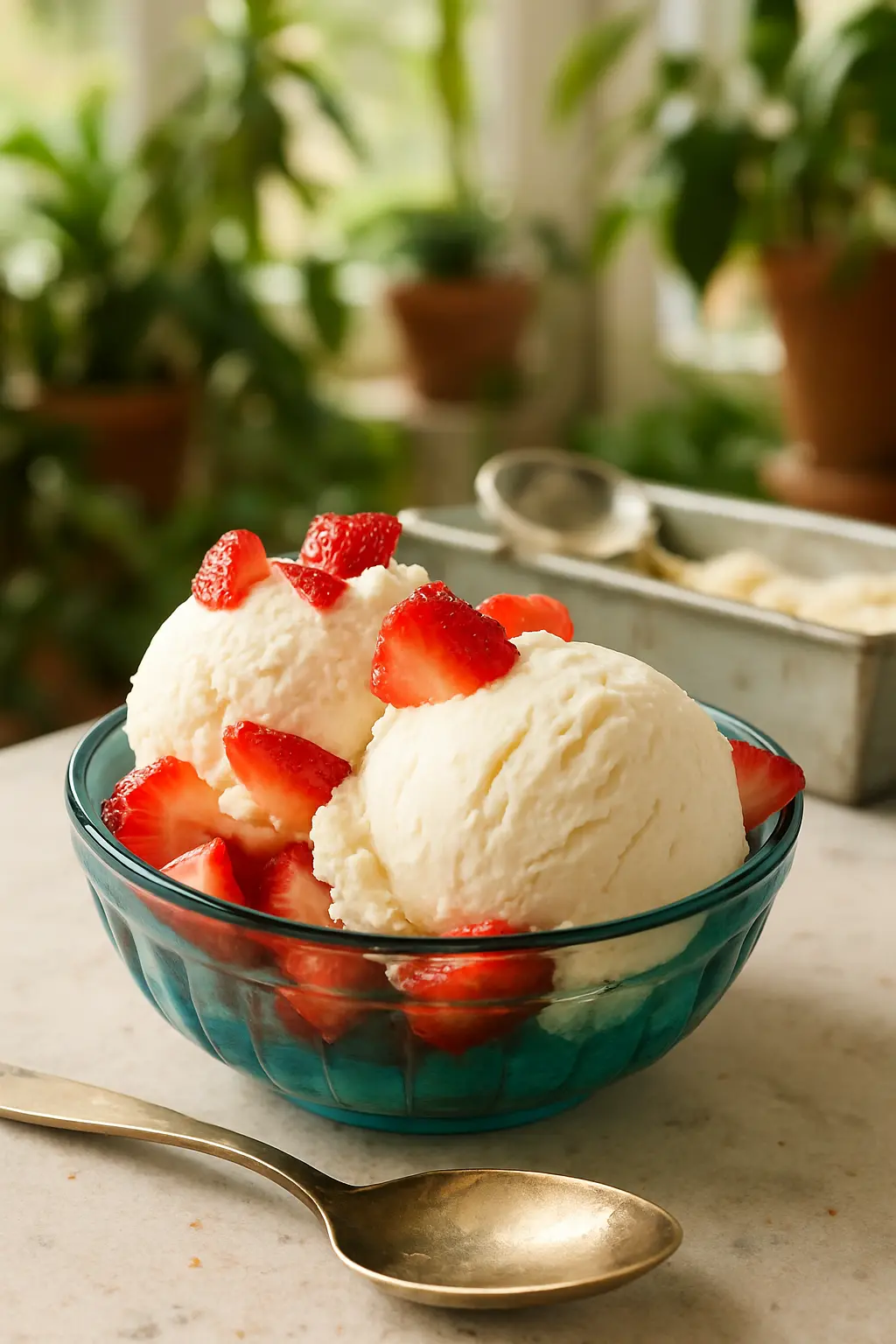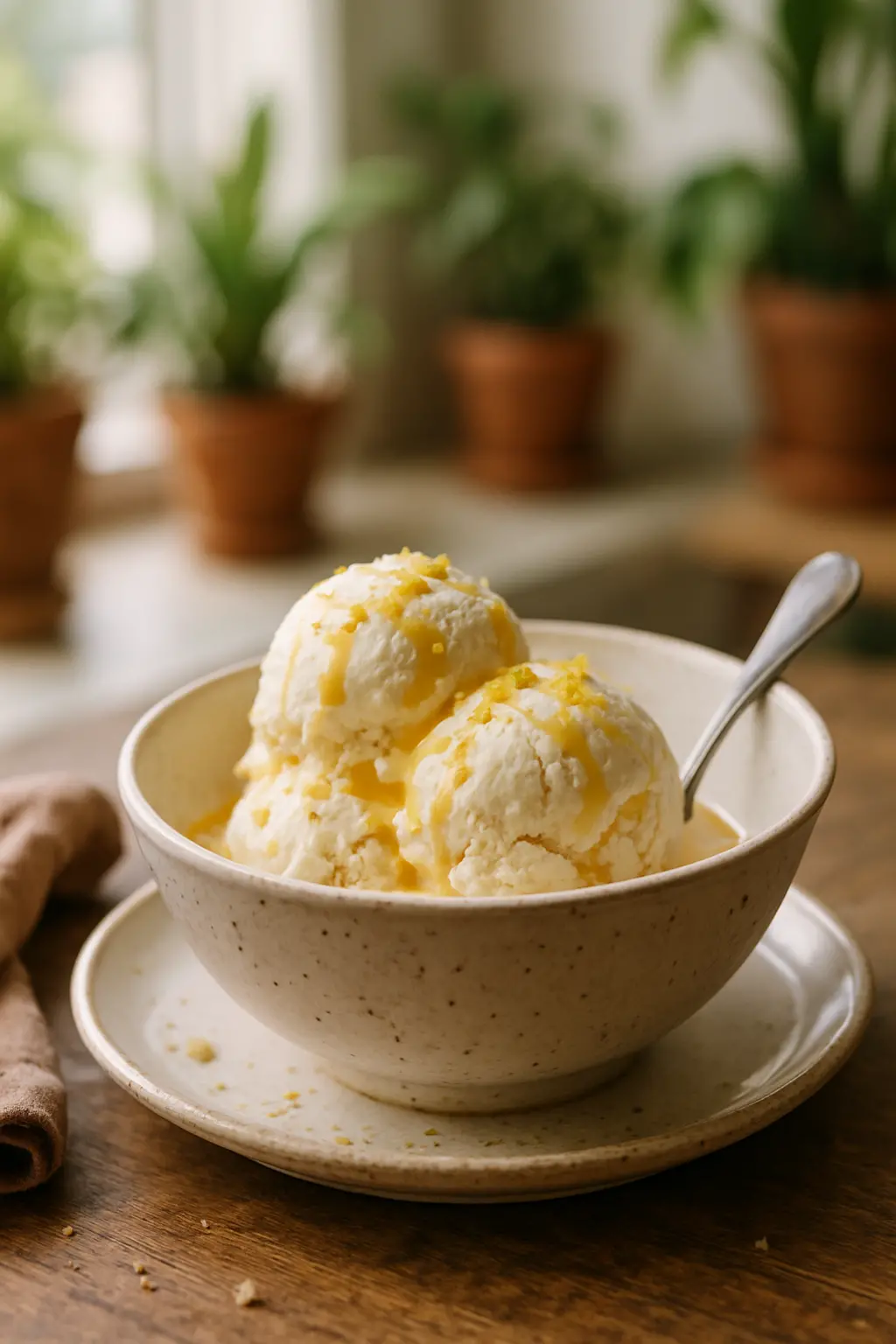How to Make Homemade Ice Cream Creamy and Not Icy
Nothing beats the rich, velvety texture of perfect homemade ice cream. But achieving that dreamy consistency without icy crystals can be tricky. This comprehensive guide reveals exactly how to make homemade ice cream creamy and not icy every single time.


How to Make Creamy Homemade Ice Cream (Not Icy!)
Instructions
- Combine cream, milk, sugar, vanilla, and salt in a medium saucepan. Heat over medium-low, whisking frequently, for 5 minutes or until the sugar dissolves and the mixture is warm.
- Transfer to a heat-safe bowl, cover, and refrigerate for 2 hours or overnight.
- Take the chilled ice cream base out of the fridge and whisk thoroughly. Churn in an ice cream maker as directed, usually 20–30 minutes. The ice cream will be soft after churning. To firm it up, transfer to an airtight container and freeze for 2–4 hours before serving.
- Store in an airtight container in the freezer for one month. If the ice cream is too hard to scoop, let it sit at room temperature briefly to soften.
Notes
Tried this recipe?
Let us know how it was!Table of Contents
- Why Homemade Ice Cream Gets Icy
- Key Ingredients for Creamy Ice Cream
- The Perfect Technique for Smooth Ice Cream
- Common Mistakes That Make Ice Cream Icy
- Pro Tips for Ultra-Creamy Texture
- Delicious Flavor Variations
Why Homemade Ice Cream Gets Icy
Understanding why ice cream develops icy texture is the first step to preventing it. The main culprits are:
- Too much water content – When water freezes, it forms ice crystals
- Insufficient fat – Fat helps create smooth texture
- Improper churning – Not enough air incorporation
- Temperature fluctuations – Causes ice crystals to grow
Learn more about perfect frozen desserts in our comprehensive guide to homemade treats.
Key Ingredients for Creamy Ice Cream
The right ingredients make all the difference in how to make ice cream with milk that stays creamy:

- Heavy cream (35-40% fat) – The high fat content prevents iciness
- Whole milk – Never use low-fat versions
- Quality vanilla extract – Adds depth of flavor
- Proper sweetener – Sugar lowers freezing point
- Pinch of salt – Enhances all flavors
For more dessert inspiration, check out our collection of foolproof recipes.
The Perfect Technique for Smooth Ice Cream
Master these steps for ice cream smooth enough to rival any premium brand:
- Freeze your ice cream maker bowl at least 24 hours
- Gently heat dairy and sugar to dissolve completely
- Chill mixture thoroughly before churning
- Churn until thick but still soft
- Transfer to freezer container with parchment barrier
- Freeze 2-4 hours before serving
Why This Works
The combination of proper fat content, sugar ratio, and controlled freezing is what makes ice cream creamy rather than icy. The churning process incorporates tiny air bubbles that keep the texture light.
Common Mistakes That Make Ice Cream Icy
Avoid these pitfalls when learning how to make homemade ice cream creamy and not icy:
- Using low-fat dairy products
- Not dissolving sugar completely
- Skipping the chilling step before churning
- Overfilling the ice cream maker
- Not using the machine long enough
- Storing in containers that allow air exposure
For more expert baking tips, visit our Pinterest board.
Pro Tips for Ultra-Creamy Texture
Take your ice cream to the next level with these professional secrets:
- Add 1 tbsp vodka or liquor to lower freezing point
- Use 1/4 cup dry milk powder for richer texture
- Try 2-3 tsp corn syrup for smoother mouthfeel
- Experiment with different vanilla extracts
- Consider stabilizers like guar gum
The right vanilla extract in ice cream makes all the difference in flavor depth. Always use pure extract rather than imitation.
Delicious Flavor Variations
Once you master the basic creamy vanilla, try these ice cream recipes:
- Chocolate – Add 1/2 cup cocoa powder
- Strawberry – Blend in 1 cup pureed berries
- Cookies and cream – Fold in crushed cookies
- Mint chip – Use peppermint extract and chocolate
- Coffee – Add 2 tbsp instant espresso
Remember, the key to all these variations is maintaining the proper creamy base. That’s what makes ice cream smooth and delightful rather than hard and icy.
How to Make Homemade Ice Cream Creamy and Not Icy
Homemade ice cream should be smooth, rich, and creamy—not icy or grainy. Achieving the perfect texture requires understanding the science behind ice cream and using the right ingredients and techniques. Here’s how to ensure your homemade ice cream stays velvety every time.
1. Use Enough Fat
Fat is crucial for creaminess. Ice cream with a higher fat content (around 14-18%) will have a smoother texture because fat coats ice crystals, preventing them from growing too large. Use heavy cream or full-fat milk for the best results.
2. Add Egg Yolks (Custard Base)
Egg yolks act as emulsifiers, binding fat and water together. A custard-based ice cream (made with egg yolks) is naturally creamier than a Philadelphia-style (eggless) version. For every 2 cups of liquid, use 3-4 yolks.
3. Incorporate Sugar Properly
Sugar lowers the freezing point, preventing large ice crystals. Too little sugar makes ice cream icy; too much makes it overly soft. Aim for 15-20% sugar by weight of your base.
4. Use Corn Syrup or Alcohol
Adding a tablespoon of corn syrup or a splash of alcohol (like vodka) keeps ice cream softer by interfering with crystallization. Alcohol doesn’t freeze, so it helps maintain a smoother texture.
5. Churn at the Right Speed
Over-churning introduces too much air, making ice cream fluffy but less creamy. Churn just until the mixture thickens (about 20-25 minutes in most machines).
6. Store Properly
Press plastic wrap directly onto the surface before freezing to prevent ice crystals. Store in an airtight container at the back of the freezer (the coldest spot).
What Makes Ice Cream Creamy?
Creaminess in ice cream comes from a balance of ingredients and techniques that minimize ice crystal formation. Here’s what contributes to that luxurious texture:
Fat Content
Dairy fat (from cream and milk) coats ice crystals, keeping them small. Higher-fat bases (like those with heavy cream) yield smoother results.
Emulsifiers
Egg yolks or commercial stabilizers (like lecithin) help blend fat and water, preventing separation and improving texture.
Sweeteners
Sugar, honey, or corn syrup lower the freezing point, ensuring a softer scoop. They also add viscosity, enhancing mouthfeel.
Air Incorporation (Overrun)
Proper churning introduces tiny air bubbles, making ice cream lighter without sacrificing creaminess. Too much air creates a foamy texture.
Rapid Freezing
Quick freezing (like in an ice cream maker) produces smaller ice crystals. Slow freezing leads to larger, grainier crystals.
Vanilla Extract in Ice Cream
Vanilla extract is a staple in homemade ice cream, adding depth and warmth. Here’s how to use it effectively:
Choosing the Right Vanilla
Pure vanilla extract offers the best flavor. Avoid imitation vanilla, which can taste artificial. For a stronger vanilla presence, use vanilla bean paste or scrape a real vanilla bean into the base.
When to Add It
Mix vanilla extract into your base after cooking (if using a custard base). Heat can evaporate some of the alcohol and volatile flavors.
How Much to Use
For 1 quart of ice cream, use 1-2 teaspoons of vanilla extract. Adjust to taste—some prefer a stronger vanilla profile.
Enhancing Vanilla Flavor
- Add a pinch of salt to amplify sweetness and vanilla notes.
- Infuse the milk/cream with a vanilla bean pod for deeper flavor.
- Pair with complementary flavors like bourbon or caramel.
Advanced Tips for Ultra-Creamy Ice Cream
1. Use Guar Gum or Xanthan Gum
A tiny amount (1/8 tsp per quart) of stabilizer prevents iciness by binding water molecules.
2. Pre-Chill Your Base
Refrigerate the mixture overnight before churning. Cold bases freeze faster, creating smaller crystals.
3. Try a Pacojet-Style Method
Blend frozen ice cream in a high-powered blender before serving to break up crystals.
4. Experiment with Milk Powders
Adding 2-3 tbsp of dry milk powder increases solids for a denser, creamier texture.
5. Avoid Overloading Mix-Ins
Too many chunks (like cookies or fruit) can disrupt the creamy texture. Fold them in gently after churning.
Common Mistakes That Cause Icy Ice Cream
- Too much water: Using low-fat milk or adding watery ingredients (like fruit puree) without adjusting the recipe.
- Insufficient churning: Not churning long enough leaves large ice crystals.
- Improper storage: Freezer burn or temperature fluctuations ruin texture.
- Skipping stabilizers: Even a small amount of cornstarch helps.
Final Thoughts
Creamy homemade ice cream is all about controlling ice crystal size and maximizing fat’s smoothing effect. With the right balance of ingredients—like rich dairy, egg yolks, and vanilla extract—plus proper technique, you can enjoy velvety-smooth ice cream every time. Experiment with these tips to perfect your recipe!